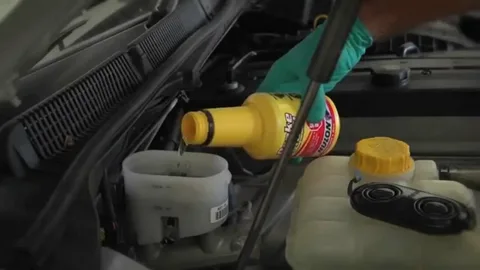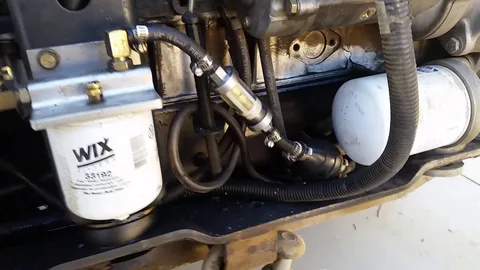If you’re looking for a way to ruin your car’s engine, pour some brake fluid into the gas tank. It’s a surefire way to destroy your engine, and it’s also pretty creative.
How Brake Fluid Can End Up in Your Gas Tank
Contents
Brake fluid is a hydraulic fluid that helps to transfer force from the brake pedal to the brake pads and calipers. When brake fluid in gas tanks becomes contaminated, it can cause a variety of problems, including reduced braking performance, increased brake pedal travel, and potential brake failure.
One way that brake fluid can become contaminated is if it leaks into the engine compartment and mixes with other fluids, like motor oil or coolant. Another way is if the brake fluid reservoir becomes low and air is sucked into the system. This can happen if the brake pads wear down too much or if there is a leak in the system.

If you think your car might have brake fluid in the gas tank, it’s important to get it checked out by a mechanic as soon as possible. Brake fluid contamination can cause serious damage to your engine and other parts of your car, so it’s important to nip the problem in the bud before it gets worse.
The Consequences of Driving With Brake Fluid in Your Gas Tank
Brake fluid is one of the most important fluids in your vehicle, and it’s important to know what can happen if you accidentally put brake fluid in your gas tank.
Brake fluid is typically a glycol-based fluid, which means it’s highly corrosive. If brake fluid gets into your gas tank, it will eat away at the tank’s lining and cause serious damage. Additionally, the brake fluid will mix with the gasoline and make the fuel less combustible. This can lead to a decrease in fuel economy and potentially damage your engine.
If you think you may have put brake fluid in your gas tank, it’s important to have it checked out by a professional as soon as possible. Trying to drive with brake fluid in your gas tank can cause serious problems and should be avoided.
How to Tell if You Have Brake Fluid in Your Gas Tank
If your car starts to produce strange sounds, smells, or feels, it may be because you have brake fluid in your gas tank. Brake fluid is a petroleum product that can damage your car’s engine if it gets into the gasoline. Here are some ways to tell if you might have brake fluid in your gas tank:
- Your car’s engine may run Rough.
- Your car may stall or have a hard time starting.
- You may see a decrease in fuel economy.
- Your car’s exhaust may smell strange.
If you think you might have brake fluid in your gas tank, it’s important to get it checked out by a mechanic as soon as possible.
How to Fix the Problem of Brake Fluid in Your Gas Tank
If you notice that your car’s brake fluid has been going down at an abnormal rate, it might be because you have a leak in your brake line. However, another possibility is that you have brake fluid in gas tanks . Although this may sound like a serious problem, it is actually quite easy to fix. Here are the steps you need to take:
- remove the cap from the gas tank and look inside. If you see any brake fluid, use a siphon to remove it.
- once all of the brake fluid has been removed, clean the inside of the gas tank with a cloth soaked in gasoline. This will remove any residue that might be left behind.
- finally, check the brake lines for any leaks. If there are any, they will need to be repaired before you put new brake fluid in the system.
How to Prevent Brake Fluid From Getting Into Your Gas Tank
Brake fluid is a hygroscopic substance, meaning that it absorbs water from the atmosphere. When brake fluid absorbs enough water, it can cause corrosion and other problems in your brake system. Brake fluid can also get into your gas tank if you have a leak in your brake line. If you think that your brake fluid may have gotten into your gas tank, here are some things you can do to prevent it from happening again.
- Check your brake lines for leaks. If you see any wetness or dripping, then you may have a leak in your brake line. You should have your brake lines inspected by a mechanic as soon as possible to prevent further damage to your vehicle.
- Keep your brake reservoir full. When your brake reservoir is low, air can enter the system and cause the fluid to become contaminated with water.
- Bleed your brakes regularly. Bleeding your brakes gets rid of any moisture that may have entered the system, and it also allows you to check for leaks in the system.
- Use quality brakes fluids. Some brake fluids are more resistant to moisture than others, so using a higher quality fluid can help reduce the risk of moisture contamination.
The Pros and Cons of Different Types of Brake Fluid
The most common types of brake fluid are DOT 3 and DOT 4. DOT 3 is a glycol-based brake fluid, while DOT 4 is a silicone-based brake fluid. Both have their pros and cons.

DOT 3 brake fluid is cheaper and has a lower boiling point than DOT 4, making it ideal for use in colder climates. However, it is also more corrosive and will damage painted surfaces, so it should not be used on vehicles with painted brake calipers.
DOT 4 brake fluid is more expensive but has a higher boiling point, making it ideal for use in hotter climates. It is also less corrosive than DOT 3 and will not damage painted surfaces.
The Best Ways to Store and Dispose of Brake Fluid
Brake fluid is a type of hydraulic fluid used in brake systems. It is generally made from glycol ethers and borate esters. Over time, brake fluid can become contaminated with moisture, which can cause corrosion and other problems in the brake system. For this reason, it is important to store brake fluid properly and to dispose of it properly when it is no longer needed.
The best way to store brake fluid is in a cool, dry place. Brake fluid should not be stored in direct sunlight or near any source of heat. It should also be stored in a tightly sealed container to keep out moisture and dirt. Once a container of brake fluid has been opened, it should be used within six months to prevent contamination.
Brake fluid can be disposed of in several ways. One way is to mix it with an absorbent material such as cat litter or sawdust and then place it in a garbage bag for disposal in the trash. Another way is to take it to a local recycling center that accepts hazardous waste.
Frequently Asked Questions FAQs
Q: What Are the Consequences of Putting Brake Fluid in My Gas Tank?
A: It depends on how much brake fluid you put in your gas tank. If you accidentally add a small amount of brake fluid to your gas tank, it’s not likely to cause any harm. However, if you add a large amount of brake fluid, it could damage your car’s engine and fuel system.
Q: How Do I Know if I’ve Put Brake Fluid in My Gas Tank?
A: If you put brake fluid in your gas tank, you’ll probably notice that your car’s engine isn’t running as smoothly as usual. You might also see smoke coming from the exhaust or smell something burning when you start the engine.
Q: How Do I Clean Up Brake Fluid if I’ve Accidentally Put It in My Gas Tank?
A: If you’ve accidentally put brake fluid in your gas tank, you should have your car’s fuel system flushed as soon as possible. This will remove the brake fluid from your car’s fuel system and prevent any further damage.
